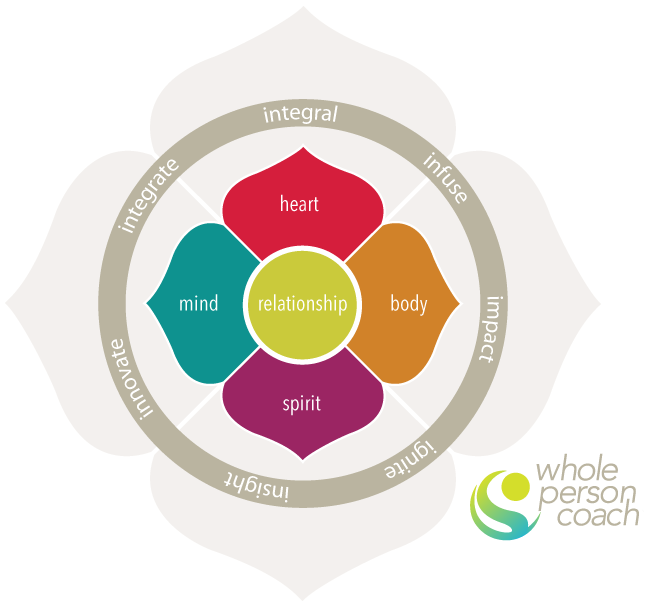“Whole Person Coaching enables you to achieve the transformational results your clients are seeking. Become an instrument of change.”
Over the past few decades, the expectations of a coach have evolved from the traditional goal-centric focus, such as creating SMART goals and taking action, to delving into the depths of human potential. Working with the whole person ensures that you have every opportunity to champion those breakthrough moments and facilitate the transformational change your ideal clients and organizations are seeking.
Whole Person Coaches learn a multi-modal coaching approach to foster positive and transformative change by engaging with the entirety of an individual’s being in any aspect of their life. This approach draws from the perspectives and best practices of cognitive, somatic, Jungian, and narrative coaching, built on the foundation of relational neuroscience.
While this may initially appear to be a broad-spectrum approach to effecting change, it’s actually a profound method for becoming an agent of transformation.
Working with the whole person—addressing their mental, emotional, physical, social, and spiritual aspects—allows you to tackle the invisible barriers to your client’s success while unlocking their greatest potential.
Your capacity to adapt your coaching approach through a multi-modal approach to change-making provides you with options on how best to serve the client in the moment and in the long term. This offers gateways to change rather than being confined to a single process or perspective.
The table below outlines the distinctions between transactional coaching (or traditional coaching), which is goal-oriented, performance coaching commonly found within corporate settings, transformational coaching, and Whole Person Coaching.
It underscores how each approach works (or doesn’t work) with the Whole Person.
| Sensing/Bodily Awareness | Feelings/Emotions | Thinking/Perceiving | Being/Identity | Doing/Results | |
| Transactional Coaching
|
N/A | May consider emotions, especially if they impact task performance. | Emphasizes cognitive processes related to planning and executing tasks efficiently. | Emphasis on doing what is necessary to meet immediate objectives, rather than exploring deeper aspects of the individual’s sense of self. | Focuses on specific actions and tasks to achieve short-term goals. |
| Performance Coaching | May include some attention to somatic awareness as related to performance. (e.g., nervousness) |
Recognizes emotions as influential in performance.
|
Explores cognitive processes related to skill development, mindset, and strategies for long-term success. | Delves into the individual’s sense of self in relation to capabilities, skills, and potential. | Considers actions and behaviors, and how they contribute to overall performance and effectiveness. |
| Transformational Coaching | Incorporates somatic awareness as a vital aspect of understanding oneself.
Recognizes the body’s wisdom in informing emotional and psychological states. |
Central focus on emotions. Involves understanding, processing, and transforming emotions to facilitate personal growth.
|
Delves deeply into the individual’s thought processes, beliefs, and values. Challenges and transforms underlying assumptions and perspectives. | Focuses on the individual’s sense of self, helping them align with their true values and purpose in life. | Involves actions and tasks, with a significant emphasis on understanding why certain actions are taken and exploring alternative approaches. |
| Our Whole Person Coaching Method | All the above +
Places a significant emphasis on
|
All the above +
Helps navigate, manage and |
All the above +
Explores cognitive Client actively learns |
All the above +
Engages the individual’s |
All the above +
Ensures actions are in |
The groundbreaking effectiveness of Whole Person Coaching lies in our pioneering multi-modality approach—a tapestry woven from the most powerful threads of psychology & neuroscience.
Beyond the confines of traditional coaching, which draw strength from cognitive neuroscience and positive psychology, our method further expands our graduates’ knowledge and skills to new heights.
Whole Person Coaching embodies the transformative wisdom gleaned from the insights of relational and cognitive neuroscience, particularly Interpersonal Neurobiology—the science of relational and embodied learning. With this knowledge, the coach learns the power of their presence and how to cultivate a depth of inner courage and confidence in their clients (and themselves).
Our holistic coaching method also draws upon the intuitive depths of somatic psychology, which is the study of how the body participates to inform how we experience and respond to our world. Understanding how our nervous system has developed through our sensory experiences gives the coach and client a chance to shift into states of higher perspective and potential. Being able to work with the body and the mind to cultivate a depth of self-awareness, understanding, and transformational growth.
In addition, we draw upon the archetypal symbolism of Jungian psychology and the narrative of self. For it is from the stories in which we weave that we perceive ourselves and the world around us.
Language plays a huge role in our meaning-making processes and how we come to know ourselves. Understanding how a person’s narrative forms their beliefs and identity unlocks the door for the coach to unwind old conditioned thought patterns and deeply held beliefs. Opening doors to new perspectives and possibilities.
This synthesis creates an alchemical blend, elevating Whole Person Coaching to an art form that resonates with the deepest layers of human potential and transformation.
With our method, you can truly work with the whole person, leveraging the deep interconnectedness of the body and mind through the power of a revolutionary life-affirming relationship.
Whole Person Coaching is a lens, a language, a way of being that sets you free to bring your best to others and helps them to do the same.
Join us and evoke change your way.


0 Comments